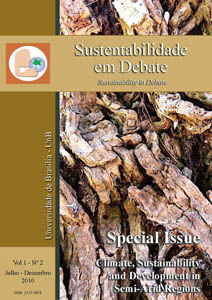Sustainable Farming Systems in the Sub-Sahelian Zone of Burkina Faso -
Key Factors
DOI:
https://doi.org/10.18472/SustDeb.v1n2.2010.1686Keywords:
Farming practices, Soil and water conservation, Sustainability, Zaï, West AfricaAbstract
Rapid population growth and climatic change threatens the sustainability of natural resources. Farming practices can mitigate environmental change and degradation. The aim of this research conducted in Yatenga region was to describe and to analyse manure practices management. In 2005, a survey was carried out to assess the evolution of farming practices. A survey was initially conducted with a sample of 44 farmers, selected randomly in the three neighbouring villages. Subsequently, 18 farms were selected for in-depth interviews. The grain yield was measured and the different practices of soil and water conservation developed by farmers were compared. According to the enquiries, two practices, called “zaï” and “djengo”, were largely used in cereals production. The “zaï” practice, known as a traditional technique for restoration of degraded soil, is characterized by the capture of runoff by micro-watersheds and a localized organic matter supply at the soil-plant system scale. The “djengo” practice is based on the same principle of the “zaï” practice but was applied on the sandy soil as traditionally “zaï” concerned the degraded and crusty soils. The two practices could increase grain crop production but moreover could limit the risk of crops failure. In addition, our observations also showed that frequent tree regenerations occurred in plots and watersheds where “zaï” or “djengo” practices were used. This study highlights the necessity of better controlling soil, water and organic matter to improve agrosystem sustainability in sub Saharan Africa.
Downloads
References
Ecology v.73, n. 608, 1992.
Boserup E. Évolution agraire et pression
démographique. Flammarion, Paris, 1970.
Couteron P., A. Mahamane, P. Ouedraogo, and
J. Seghieri. J. Veg. Sci. v. 11 pp. 321-328, 2000.
CORAF/CRDI. Activités de recherche
conduites dans le cadre du projet R3S :
intégration agriculture-élevage et gestion des
ressources naturelles (campagne 2001-2002).
Rapport technique, 2002.
Dugué, P. Programme de Recherche-
Développement au Yatenga, programme
d’agronomie : Rapport de synthèse 1984,
1986.
Dugué, P. Possibilités et limites de
l’intensification des systèmes de culture
vivriers en zone soudano-sahélienne : le cas
du Yatenga (Burkina Faso). Extrait de thèse
de l’ENSAM, Collection « Documents Systèmes
Agraires » N° 9 du CIRAD, 1989.
FAO. World reference base for soil resources.
World Soil Resources Reports, 1998.
Floret C., and R. Pontanier. John Libbey
Eurotext, 2000.
Guillaume K., M. Huard, J. Gignoux, A. Mariotti,
and Abbadie L. . Oecologia v. 127, p 295-304,
2001.
Lal R., Soil Sci. 165 (57) 2000.
Lata J.-C., K. Guillaume, V. Degrange, L.
Abbadie, and R. Lensi. Proc. R. Soc. Lond. B v.
267, n. 595, 2000.
Meyer K.M., K. Wiegand, D. Ward, and A.
Moustakas. J. Ecol. v. 95, p.1306-1315, 2007.
Manlay R.J., A. Ickowicz, D. Masse, C. Feller,
and D. Richard. Agr. Syst. V.79 n. 83, 2004.
Marchal J.Y. Yatenga, nord Haute-Volta : la
dynamique d’un espace rural soudanosahélien.
ORSTO:, Paris, 1983.
Mazzucato V, Niemeijer D. Rethinking soil and
water conservation in a changing society: a case
study in eastern Burkina Faso. Tropical
Resource Management Papers, 2000.
McMilland D, Nana JB, Sawadogo K. Settlement
and Development in River Basin control Zones:
Case study Burkina Faso. World Bank
Technical Paper n. 200, 1990.
Odum H.T., and B. Odum. Ecol. Eng. V. 20 n.
339, 2003.
Reij C. et Thiombiano T. Développement rural
et environnement au Burkina Faso : la
réhabilitation de la capacité productive des
terroirs sur la partie nord du Plateau Central entre 1980 et 2001. GTZ-PATECORE, USAID,
rapport de synthèse, 2003.
Roose E., V. Kaboré, and C. Guenat. Arid Soil
Res. Rehab. V. 13, n. 343, 1999.
Tittonell P., B. Vanlauwe, N. de Ridder, and K.E.
Giller. Agr. Syst. v. 94, n. 376, 2007.
Tittonell P., B. Vanlauwe, P.A. Leffelaar, E.C.
Rowe, and K.E. Giller. Agric. Ecosyst. Environ.
V. 110, n. 149, 2005.
Tittonell P., B. Vanlauwe, P.A. Leffelaar, K.D.
Shepherd, and K.E. Giller. Agric. Ecosyst.
Environ. V. 110(2005)166.
Valentin C., J.-L. Rajot, and D. Mitja. Agric.
Ecosyst. Environ. 104 (287), 2004.
Wiegand K., D. Saltz, and D. Ward. Perspect.
Plant Ecol. V. 7, n. 229, 2006.
Downloads
Published
How to Cite
Issue
Section
License
Copyright (c) 2010 Sustentabilidade em Debate

This work is licensed under a Creative Commons Attribution-NonCommercial-NoDerivatives 4.0 International License.
SUSTAINABILITY IN DEBATE – Copyright Statement
The submission of original scientific work(s) by the authors, as the copyright holders of the text(s) sent to the journal, under the terms of Law 9.610/98, implies in the concession of copyrights of printed and/or digital publication to the Sustainability in Debate Journal of the article(s) approved for publication purposes, in a single issue of the journal. Furthermore, approved scientific work(s) will be released without any charge, or any kind of copyright reimbursement, through the journal’s website, for reading, printing and/or downloading of the text file, from the date of acceptance for publication purposes. Therefore, the authors, when submitting the article (s) to the journal, and gratuitous assignment of copyrights related to the submitted scientific work, are fully aware that they will not be remunerated for the publication of the article(s) in the journal.
The Sustainability in Debate Journal is licensed under Creative Commons License – Non-Commercial-No-Derivation Attribution (Derivative Work Ban) 3.0 Brazil, aiming at dissemination of scientific knowledge, as indicated on the journal's website, which allows the text to be shared, and be recognized in regards to its authorship and original publication in this journal.
Authors are allowed to sign additional contracts separately, for non-exclusive distribution of the works published in the Sustainability in Debate Journal (for example, in a book chapter), provided that it is expressed the texts were originally published in this journal. Authors are allowed and encouraged to publish and distribute their text online, following publication in Sustainability in Debate (e.g. in institutional repositories or their personal pages). The authors expressly agree to the terms of this Copyright Statement, which will be applied following the submission and publishing by this journal.








